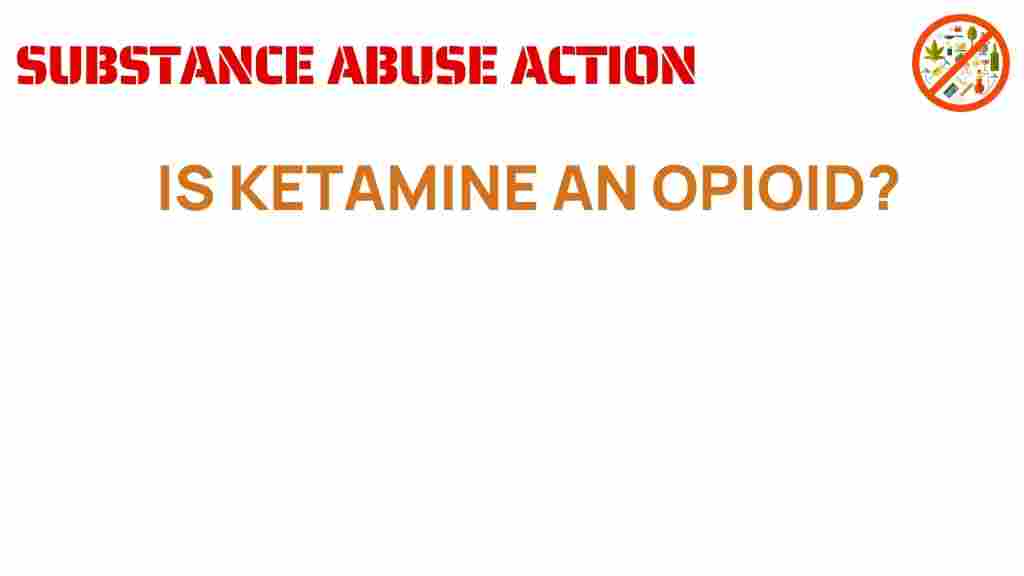Unraveling the Mystery: Is Ketamine an Opioid or Something More?
Ketamine has gained attention in recent years, particularly in the context of mental health treatment. With increasing discussions around its potential benefits, many people are left wondering: is ketamine an opioid or something entirely different? This article explores the nature of ketamine, its applications in mental health, and dispels common misconceptions surrounding its classification as an opioid.
Understanding Ketamine
Ketamine is a medication that was originally developed in the 1960s as an anesthetic. It is classified as a dissociative anesthetic, meaning it induces a trance-like state while providing pain relief and sedation. Unlike opioids, ketamine works by inhibiting the N-methyl-D-aspartate (NMDA) receptor in the brain, which is linked to pain perception and mood regulation.
Ketamine vs. Opioids: Key Differences
To understand whether ketamine is an opioid, it is crucial to identify the differences between the two substances:
- Mechanism of Action: Ketamine primarily affects the NMDA receptor, while opioids bind to the opioid receptors in the brain, altering pain perception and emotional responses.
- Classification: Ketamine is classified as a dissociative anesthetic, whereas opioids are categorized as narcotic analgesics.
- Potential for Addiction: While both substances can lead to misuse, opioids have a higher potential for addiction due to their effects on the brain’s reward system.
- Uses: Ketamine is used for anesthesia and treatment of depression and other mental health disorders, while opioids are primarily used for pain management.
The Role of Ketamine in Mental Health Treatment
Ketamine’s unique properties have led to its exploration as a treatment option for various mental health conditions, particularly depression. Traditional antidepressants often take weeks to show effects, but ketamine can provide rapid relief for individuals suffering from severe depression and suicidal thoughts.
How Ketamine Works in Treating Depression
Research indicates that ketamine’s antidepressant effects may stem from several mechanisms:
- Neuroplasticity: Ketamine promotes synaptogenesis, the formation of new synapses, which can help restore normal brain function.
- Glutamate Regulation: By modulating glutamate levels, ketamine can enhance mood and cognitive function.
- Anti-inflammatory Effects: Ketamine has been shown to reduce inflammation, which is often linked to mood disorders.
Misconceptions About Ketamine
There are several misconceptions surrounding ketamine and its use in mental health treatment, particularly regarding its classification as an opioid. Here are some common myths:
Myth 1: Ketamine is an Opioid
As previously mentioned, ketamine is not an opioid. It operates through different pathways in the brain and is not classified as a narcotic. Understanding this distinction is crucial for patients considering treatment options.
Myth 2: Ketamine is Only for Severe Cases
While ketamine is often used for treatment-resistant depression, it can also benefit those with moderate depression who have not responded to traditional therapies. It offers an alternative for individuals seeking faster relief.
Myth 3: Ketamine is Addictive
Although any substance can be misused, ketamine has a lower potential for addiction compared to opioids. When administered in a clinical setting and monitored by healthcare professionals, the risk of addiction is significantly minimized.
Step-by-Step Process of Ketamine Treatment
If you are considering ketamine therapy, understanding the process can help alleviate concerns and prepare you for what to expect:
- Initial Consultation: Meet with a mental health professional to discuss your history, symptoms, and treatment goals.
- Assessment: A thorough assessment may include psychological evaluations and medical history to determine if ketamine is an appropriate option for you.
- Treatment Plan: If approved, a tailored treatment plan will be created, outlining the dosage and frequency of ketamine infusions or nasal spray.
- Administration: Ketamine can be administered via IV infusion or nasal spray in a controlled environment, ensuring safety and monitoring.
- Follow-Up: Regular follow-up appointments will be scheduled to assess progress, side effects, and any adjustments needed in your treatment plan.
What to Expect During Treatment
Patients may experience various effects during treatment, such as:
- Altered sensory perceptions
- Relaxation or feelings of euphoria
- Temporary dissociation or detachment
These effects usually subside shortly after the treatment session. It is essential to discuss any concerns or side effects with your healthcare provider.
Troubleshooting Tips for Ketamine Treatment
As with any treatment, it’s important to address potential issues that may arise during ketamine therapy:
1. Managing Side Effects
Common side effects may include dizziness, nausea, or perceptual changes. If these become bothersome:
- Communicate with your healthcare provider for possible adjustments.
- Stay hydrated and rest after the treatment session.
- Consider mindfulness or relaxation techniques to manage anxiety.
2. Addressing Efficacy Concerns
Not everyone responds to ketamine therapy in the same way. If you notice minimal improvement:
- Keep track of your symptoms and discuss them with your provider.
- Explore additional therapeutic options, such as psychotherapy or lifestyle changes.
- Be open to adjusting the treatment plan as needed.
3. Understanding the Cost
Ketamine treatment can be expensive and is often not covered by insurance. To manage costs:
- Inquire about payment plans or sliding scale fees.
- Research clinics that offer competitive pricing.
- Discuss potential financial assistance options with your provider.
Conclusion
In summary, ketamine is not an opioid but a unique medication with distinct properties that offer promising solutions for mental health treatment, particularly in depression. By understanding its mechanisms, benefits, and potential side effects, patients can make informed decisions regarding their treatment options. If you are considering ketamine therapy, consult with a qualified healthcare professional to explore whether it is the right fit for your mental health needs.
For more information on mental health treatments, visit Mental Health Resources.
To understand more about opioid classifications and effects, check out this detailed guide here.
This article is in the category Treatment and created by SubstanceAbuseAction Team
